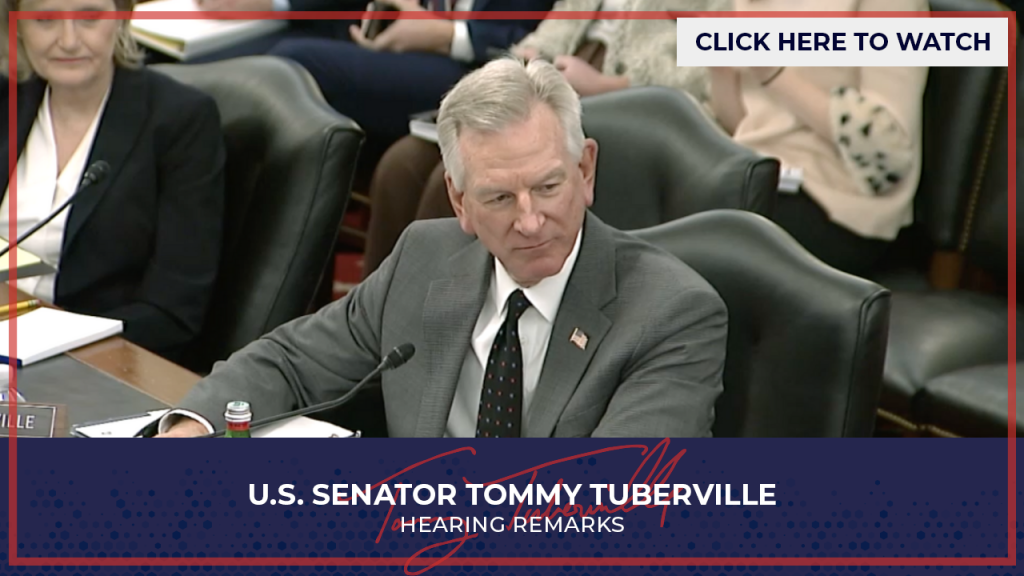WASHINGTON – On Thursday, U.S. Senator Tommy Tuberville advocated for increased access to capital, tools to hedge risk, rural broadband, and the needs of rural communities. In a Senate Agriculture, Nutrition, and Forestry (AG) Committee hearing, Senator Tuberville questioned Dr. Basil Ivanhoe Gooden, nominee for U.S. Department of Agriculture’s (USDA) Under Secretary of Agriculture for Rural Development, and Summer K. Mersinger, nominee for the Commodity Futures Trading Commission (CFTC), about their efforts to improve opportunities for rural communities.
As Alabama’s voice on the AG Committee and Ranking Member of the AG Subcommittee on Rural Development and Energy, Senator Tuberville is actively advocating for the state’s rural communities and agricultural priorities in Farm Bill hearings.
Excerpts from Senator Tuberville’s remarks can be found below, and his full remarks can be found here.
On Increasing FSA Loan Caps
TUBERVILLE: “Dr. Gooden, a couple quick questions, would increasing the guaranteed FSA [Farm Service Agency] loan cap expand access to capital and credit in rural communities?”
GOODEN: “Senator, thank you so much for that question. Actually, we work with our colleagues across USDA and certainly in FSA as well—focused on improving farmers’, ranchers’ livability and livelihood…And so, if I’m so honored to be confirmed, I’ll certainly work with FSA and other parts of USDA to really address these issues in rural America. Currently that’s outside of the purview of RD, Rural Development, but certainly is a focus of rural livability.”
TUBERVILLE: “I think it’s something we need to address. Especially in some of the states like where I’m from. I think it’s pretty important.”
On Promoting Tech Neutrality in Rural Broadband
TUBERVILLE: “Dr. Gooden, you and I talked about rural broadband. Considering the strong push for fiber we’re seeing from this Administration, can you speak to the importance of promoting tech neutrality amongst all broadband technologies – including fiber, and coax?”
GOODEN: “Thank you, Senator.”
TUBERVILLE: “It’s a lot cheaper.”
GOODEN: GOODEN: “What we’re focused on, certainly, at rural development is the quality of the broadband and the standards. Right now, 100/100 [megabits per second (Mbps)]—that’s what we’re focused on. We’re pretty agnostic related to the technologies. And again, I personally—my family and my community members in Buckingham County, Virginia—we understand the need for high-speed internet and the impact that it makes in lives. Certainly, as I shared with you, right through our family farm, there was fiber laid along a natural gas pipeline, only two hundred yards from my house and we weren’t able to connect to that high-speed internet at all. So, we’re agnostic related to the technologies—again, open to all technologies—again, we’re focused on the quality of broadband that actually is deployed in these rural areas.”
TUBERVILLE: “We’ve got to do something pretty quick because this technology in farm equipment is getting more complex—GPSs and things like that. I know you’ll do a good job with that, but I think that’s one of the most important things we can do for our farmers.”
On Making Derivatives More Accessible
TUBERVILLE: “Commissioner, as you know, our farmers rely on derivatives to hedge [against] risk. I just did a huge sweep of the South, and I was shocked at how many people hedge their farms. It’s real, real important. What are you doing at the CFTC to make derivatives products more accessible to [our] producers, and particularly small farmers?”
MERSINGER: “Thank you for that question, and certainly making sure that America’s farmers and ranchers can use our markets to hedge their risks—and a lot of times this is an important tool that they need to access credit—so certainly ensuring that they have access to these markets is very important. I think one of the things that we can be doing and that hopefully at some point we’ll be able to do is use our office of customer education and outreach to better get in touch with those small farmers and ranchers and at least introduce them to the markets and how they can help. You mentioned access—earlier, when I was speaking to Senator Smith, I mentioned that we are seeing smaller numbers of the Futures Commissioned Merchants, and that’s a critical piece of accessing futures markets. Certainly, we need to look at whether there are policies impacting that and whether there are barriers to entry, and just make sure that those who want to access our markets can, and that they’re serving the price discovery role that they’re meant to serve.”
TUBERVILLE: Are you seeing people reach out to you about education and what you’re doing – farmers? Is there a huge need for maybe education in this area?
MERSINGER: Yes, there is. And we do try to leverage some of our relationships with the various farm groups. We do have some limitations on how we can spend funds in our Office of Consumer Education [and Outreach]. I think it would be very helpful if the Committee decided to do reauthorization if we were able to expand that ability to better reach farmers and ranchers.
Senator Tommy Tuberville represents Alabama in the United States Senate and is a member of the Senate Armed Services, Agriculture, Veterans’ Affairs, and HELP Committees.
###
